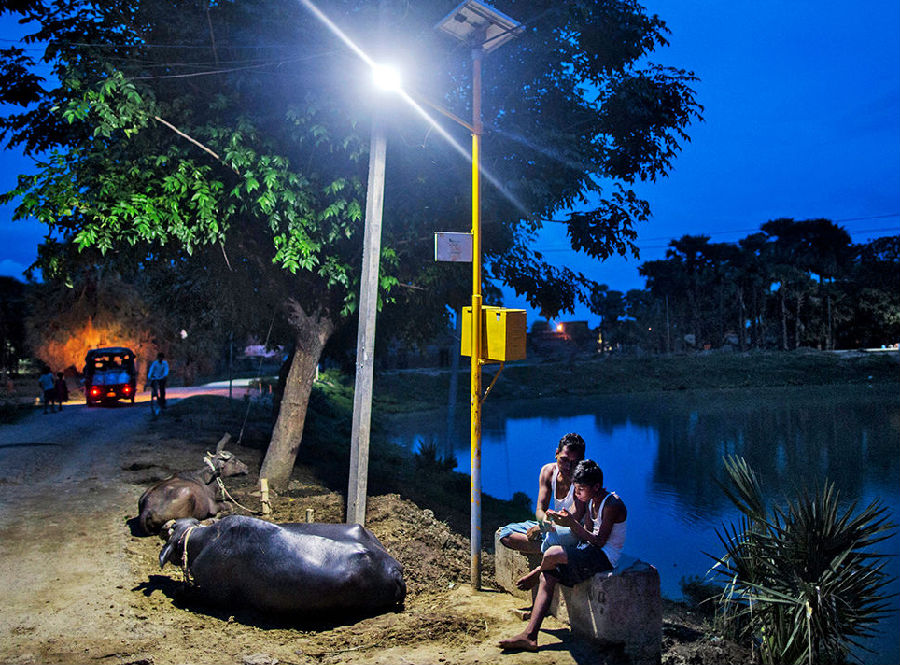A forested village in Jharkhand state, eastern India, Narotoli is home mainly to adherents of Sarna, a nature-worshipping tribal religion.
Narotoli,位于印度東部爾克汗邦的一個草木叢生的村莊,這里居住的大部分都是薩爾納(崇拜自然的部落宗教)的追隨者。
In more ways than one, it has long been off-grid.
他們對自然的崇拜不止一個方面,這個村莊一直都是自給自足的。
Drive past a police checkpoint a few miles away and you are in territory loyal to "the guys", a euphemism for Maoist guerrillas.
開車穿過一個警察檢查站幾英里遠,你就來到了一處忠誠于“那些家伙”的領地。
That makes Narotoli more marginalised than most places.
這使得Narotoli比其他多數地區更加邊緣化。
A few months ago it became one of the last in India to benefit from a push by Narendra Modi, the prime minister,
在印度總理納倫德拉·莫迪的推動下,印度所有村莊都通上了電,
to supply electricity to all the country's villages.
Narotoli在幾個月前成為了受益于次舉的最后幾個村莊之一。
But the power lines are so "reliably unreliable", says an Indian executive, that they might as well be washing lines.
但是一位印度執行官表示,電力線“確實不可靠”,因此這些電力線也可能變成晾衣繩。
Two years before the grid arrived, however, Mlinda, a social enterprise, had set up a "mini-grid",
但是兩年前電網運到此處之前,一家社會企業Mlinda已經建起了一種“微電網”,
a bank of batteries charged by solar panels and hooked up to homes, to guarantee round-the-clock power independent of the national network.
通過太陽能板充電并連接到各家各戶,以確保全天候電力獨立于國家電網。
Mini-grids are different from the rooftop solar panels and batteries (sometimes linked up in "micro-grids")
微電網不同于屋頂的太陽能板和電池(有時在“微電網”中相連接)
increasingly used in poor countries to provide LED lighting and to charge mobile phones.
這種電網在貧窮國家得到廣泛應用,為LED電燈和手機提供電力。

Narotoli's 22.5-kilowatt mini-grid provides lighting to scores of homes linked by its poles and wires,
Narotoli的22.5千瓦微電網通過極點和電線為許多家庭提供燈光,
as well as powering a seed-crushing machine for cooking oil,
也為食用油軋碎機、
irrigation in the dry season and power for a poultry farm-all of which engender economic activity.
干旱季節的灌溉以及產生經濟活動的家禽飼養所提供電力。
The power generated by the plant is expensive (though it costs less than villagers often pay for alternatives
電廠供電價格昂貴(雖然與村民們常用的煤油照明和柴油機灌溉相比,
such as kerosene for lighting and diesel for irrigation pumps).
這種這種方式的成本較低)。
The worry is that demand for electricity may not be enough to justify the installation cost.
人們的擔憂在于,對電力的需求或許不夠充足,不足以證明該設備安裝成本的優勢。
As one Indian official recently scoffed: "Why provide a Ferrari to people who need a bullock cart?"
正如近期一名印度官員笑言:“為什么要給一個需要牛車的人一輛法拉利呢?”
But Mlinda and other mini-grid installers see them as more than a way to satisfy existing demand for electricity: they are a way to catalyse development.
但是Mlinda和其他微電網安裝商不僅是將此當做滿足現有電力需求的一種方法:更是一種促進發展的方式。
The installers advise villagers on irrigation, farming and marketing to help them develop businesses that require reliable electricity,
安裝商在灌溉、農耕和市場方面為村民提供建議幫助他們發展需要可靠電力的商業
which in turn justifies the expense of installation.
而反過來也能使安裝成本公平化。
譯文由可可原創,僅供學習交流使用,未經許可請勿轉載。












